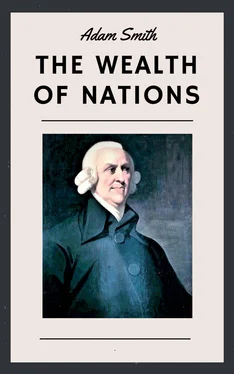Adam Smith - Adam Smith - The Wealth of Nations (English Edition)
Здесь есть возможность читать онлайн «Adam Smith - Adam Smith - The Wealth of Nations (English Edition)» — ознакомительный отрывок электронной книги совершенно бесплатно, а после прочтения отрывка купить полную версию. В некоторых случаях можно слушать аудио, скачать через торрент в формате fb2 и присутствует краткое содержание. Жанр: unrecognised, на английском языке. Описание произведения, (предисловие) а так же отзывы посетителей доступны на портале библиотеки ЛибКат.
- Название:Adam Smith: The Wealth of Nations (English Edition)
- Автор:
- Жанр:
- Год:неизвестен
- ISBN:нет данных
- Рейтинг книги:4 / 5. Голосов: 1
-
Избранное:Добавить в избранное
- Отзывы:
-
Ваша оценка:
- 80
- 1
- 2
- 3
- 4
- 5
Adam Smith: The Wealth of Nations (English Edition): краткое содержание, описание и аннотация
Предлагаем к чтению аннотацию, описание, краткое содержание или предисловие (зависит от того, что написал сам автор книги «Adam Smith: The Wealth of Nations (English Edition)»). Если вы не нашли необходимую информацию о книге — напишите в комментариях, мы постараемся отыскать её.
Adam Smith: The Wealth of Nations (English Edition) — читать онлайн ознакомительный отрывок
Ниже представлен текст книги, разбитый по страницам. Система сохранения места последней прочитанной страницы, позволяет с удобством читать онлайн бесплатно книгу «Adam Smith: The Wealth of Nations (English Edition)», без необходимости каждый раз заново искать на чём Вы остановились. Поставьте закладку, и сможете в любой момент перейти на страницу, на которой закончили чтение.
Интервал:
Закладка:
It is in this manner that money has become, in all civilized nations, the universal instrument of commerce, by the intervention of which goods of all kinds are bought and sold, or exchanged for one another.
What are the rules which men naturally observe, in exchanging them either for money, or for one another, I shall now proceed to examine. These rules determine what may be called the relative or exchangeable value of goods.
The word VALUE, it is to be observed, has two different meanings, and sometimes expresses the utility of some particular object, and sometimes the power of purchasing other goods which the possession of that object conveys. The one may be called 'value in use;' the other, 'value in exchange.' The things which have the greatest value in use have frequently little or no value in exchange; and, on the contrary, those which have the greatest value in exchange have frequently little or no value in use. Nothing is more useful than water; but it will purchase scarce any thing; scarce any thing can be had in exchange for it. A diamond, on the contrary, has scarce any value in use; but a very great quantity of other goods may frequently be had in exchange for it.
In order to investigate the principles which regulate the exchangeable value of commodities, I shall endeavour to shew,
First, what is the real measure of this exchangeable value; or wherein consists the real price of all commodities.
Secondly, what are the different parts of which this real price is composed or made up.
And, lastly, what are the different circumstances which sometimes raise some or all of these different parts of price above, and sometimes sink them below, their natural or ordinary rate; or, what are the causes which sometimes hinder the market price, that is, the actual price of commodities, from coinciding exactly with what may be called their natural price.
I shall endeavour to explain, as fully and distinctly as I can, those three subjects in the three following chapters, for which I must very earnestly entreat both the patience and attention of the reader: his patience, in order to examine a detail which may, perhaps, in some places, appear unnecessarily tedious; and his attention, in order to understand what may perhaps, after the fullest explication which I am capable of giving it, appear still in some degree obscure. I am always willing to run some hazard of being tedious, in order to be sure that I am perspicuous; and, after taking the utmost pains that I can to be perspicuous, some obscurity may still appear to remain upon a subject, in its own nature extremely abstracted.
CHAPTER V. OF THE REAL AND NOMINAL PRICE OF COMMODITIES, OR OF THEIR PRICE IN LABOUR, AND THEIR PRICE IN MONEY.
Every man is rich or poor according to the degree in which he can afford to enjoy the necessaries, conveniencies, and amusements of human life. But after the division of labour has once thoroughly taken place, it is but a very small part of these with which a man's own labour can supply him. The far greater part of them he must derive from the labour of other people, and he must be rich or poor according to the quantity of that labour which he can command, or which he can afford to purchase. The value of any commodity, therefore, to the person who possesses it, and who means not to use or consume it himself, but to exchange it for other commodities, is equal to the quantity of labour which it enables him to purchase or command. Labour therefore, is the real measure of the exchangeable value of all commodities.
The real price of every thing, what every thing really costs to the man who wants to acquire it, is the toil and trouble of acquiring it. What every thing is really worth to the man who has acquired it and who wants to dispose of it, or exchange it for something else, is the toil and trouble which it can save to himself, and which it can impose upon other people. What is bought with money, or with goods, is purchased by labour, as much as what we acquire by the toil of our own body. That money, or those goods, indeed, save us this toil. They contain the value of a certain quantity of labour, which we exchange for what is supposed at the time to contain the value of an equal quantity. Labour was the first price, the original purchase money that was paid for all things. It was not by gold or by silver, but by labour, that all the wealth of the world was originally purchased; and its value, to those who possess it, and who want to exchange it for some new productions, is precisely equal to the quantity of labour which it can enable them to purchase or command.
Wealth, as Mr Hobbes says, is power. But the person who either acquires, or succeeds to a great fortune, does not necessarily acquire or succeed to any political power, either civil or military. His fortune may, perhaps, afford him the means of acquiring both; but the mere possession of that fortune does not necessarily convey to him either. The power which that possession immediately and directly conveys to him, is the power of purchasing a certain command over all the labour, or over all the produce of labour which is then in the market. His fortune is greater or less, precisely in proportion to the extent of this power, or to the quantity either of other men's labour, or, what is the same thing, of the produce of other men's labour, which it enables him to purchase or command. The exchangeable value of every thing must always be precisely equal to the extent of this power which it conveys to its owner.
But though labour be the real measure of the exchangeable value of all commodities, it is not that by which their value is commonly estimated. It is often difficult to ascertain the proportion between two different quantities of labour. The time spent in two different sorts of work will not always alone determine this proportion. The different degrees of hardship endured, and of ingenuity exercised, must likewise be taken into account. There may be more labour in an hour's hard work, than in two hours easy business; or in an hour's application to a trade which it cost ten years labour to learn, than in a month's industry, at an ordinary and obvious employment. But it is not easy to find any accurate measure either of hardship or ingenuity. In exchanging, indeed, the different productions of different sorts of labour for one another, some allowance is commonly made for both. It is adjusted, however, not by any accurate measure, but by the higgling and bargaining of the market, according to that sort of rough equality which, though not exact, is sufficient for carrying on the business of common life.
Every commodity, besides, is more frequently exchanged for, and thereby compared with, other commodities, than with labour. It is more natural, therefore, to estimate its exchangeable value by the quantity of some other commodity, than by that of the labour which it can produce. The greater part of people, too, understand better what is meant by a quantity of a particular commodity, than by a quantity of labour. The one is a plain palpable object; the other an abstract notion, which though it can be made sufficiently intelligible, is not altogether so natural and obvious.
But when barter ceases, and money has become the common instrument of commerce, every particular commodity is more frequently exchanged for money than for any other commodity. The butcher seldom carries his beef or his mutton to the baker or the brewer, in order to exchange them for bread or for beer; but he carries them to the market, where he exchanges them for money, and afterwards exchanges that money for bread and for beer. The quantity of money which he gets for them regulates, too, the quantity of bread and beer which he can afterwards purchase. It is more natural and obvious to him, therefore, to estimate their value by the quantity of money, the commodity for which he immediately exchanges them, than by that of bread and beer, the commodities for which he can exchange them only by the intervention of another commodity; and rather to say that his butcher's meat is worth three-pence or fourpence a-pound, than that it is worth three or four pounds of bread, or three or four quarts of small beer. Hence it comes to pass, that the exchangeable value of every commodity is more frequently estimated by the quantity of money, than by the quantity either of labour or of any other commodity which can be had in exchange for it.
Читать дальшеИнтервал:
Закладка:
Похожие книги на «Adam Smith: The Wealth of Nations (English Edition)»
Представляем Вашему вниманию похожие книги на «Adam Smith: The Wealth of Nations (English Edition)» списком для выбора. Мы отобрали схожую по названию и смыслу литературу в надежде предоставить читателям больше вариантов отыскать новые, интересные, ещё непрочитанные произведения.
Обсуждение, отзывы о книге «Adam Smith: The Wealth of Nations (English Edition)» и просто собственные мнения читателей. Оставьте ваши комментарии, напишите, что Вы думаете о произведении, его смысле или главных героях. Укажите что конкретно понравилось, а что нет, и почему Вы так считаете.












